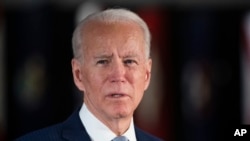Democratic presidential candidates Joe Biden and Bernie Sanders are to deliver separate addresses on the coronavirus on Thursday, less than 24 hours after President Donald Trump spoke to the nation from the Oval Office about a public health crisis he’d previously downplayed.
Biden aides pitch his speech, to be delivered from the former vice president’s hometown of Wilmington, Delaware, as a demonstration of how he might conduct himself as president in response to a severe challenge, while contrasting himself with a Republican president he has lambasted as erratic and incompetent.
The event also allows Biden to juxtapose his style and approach with that of Sanders, his last remaining rival for the Democratic nomination. The Vermont senator will give his own speech two hours later in his hometown of Burlington, Vermont.
Biden now leads Sanders by more than 150 delegates after winning four more state primaries Tuesday, with Washington state still being counted. And his advantage could expand considerably next Tuesday when the delegate-rich states of Florida, Illinois and Ohio hold primaries.
For Biden, the ideal will be to give voters a practical example of one of his core arguments: that he’d be ready on Inauguration Day to handle whatever trials reach the Oval Office. In some ways, the dynamics recall the financial crisis that mushroomed late in the summer of 2008. The meltdown further damaged outgoing President George W. Bush and his Republican Party, dealing GOP nominee John McCain a new setback and granting a wider opening for Democratic nominee Barack Obama and his running mate, Biden. But that unfolded weeks before the election — Biden must keep making his case for nearly eight months.
Biden and Sanders have both canceled public events ahead of next Tuesday’s primaries, yielding to public health officers and elected officials who are discouraging large campaign rallies. The pair will meet in a debate Sunday night on CNN, without a live audience.
For most people, the new coronavirus causes only mild or moderate symptoms, such as fever and cough. For some, especially older adults and people with existing health problems, it can cause more severe illness, including pneumonia.
Sanders is 78. Biden is 77.
The vast majority of people recover from the new virus. According to the World Health Organization, people with mild illness recover in about two weeks, while those with more severe illness may take three to six weeks to recover.
Regardless of how Biden handles the moment, the coronavirus outbreak comes at a political juncture for him.
He’s solidified his position as the prohibitive favorite for his party’s nomination, but Sanders has made clear he’s not ready to abandon his campaign, and many of the senator’s supporters on the progressive left aren’t enthusiastic about embracing Biden as the Democratic standard-bearer. That slice of the Democratic coalition likely isn’t enough to derail Biden’s nomination, but it could complicate his efforts in a general election campaign, just as it did for Hillary Clinton in 2016 after she defeated Sanders but lost to Trump in November.
Projecting leadership on a grave public health matter could be a boon with the middle of the electorate, especially independents and moderate Republicans wary of Trump. But it won’t necessarily corral Sanders supporters who also will play key roles in deciding battleground-state outcomes in November.
For his part, Trump said Thursday he’s “very happy to run against” Biden.
“One of the reasons I ran for president was because of Joe and the job they did,” Trump said, referring to Biden’s time as Obama’s vice president. “It’s maybe the way it should be.”




